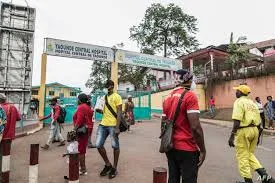The International Monetary Fund has announced it is giving Cameroon US $156 million, an equivalence of 86.5 billion FCFA, through the Rapid Credit Facility (RCF) “to help Cameroon address urgent balance of payment needs stemming from the COVID-19 pandemic.”
The IMF says the financial aid will address urgent financial needs caused by the pandemic especially in sectors such as health, social protection, and to support the most vulnerable people.
This is the second emergency financial disbursement the IMF is making to Cameroon in the wake of the COVID-19 pandemic after an earlier disbursement of US $120 million under the Rapid Credit Facility.
According to the IMF, Cameroon has an urgent financial need of FCFA 917 billion which results from the drop in the external demand of major income generating exports and the drastic increase in health and social expenditure in efforts to contain COVID-19.
Since the approval of the first Rapid Credit Facility (RCF-1) request on May 4, 2020 (IMF Country Report No 20/185), weaker external demand in major trading partners and a more pronounced impact of containment measures to slow the rising number of COVID-19 cases have further deteriorated growth prospects and worsened Cameroon’s external and fiscal positions.
As a result, urgent balance of payments needs arising from the pandemic have increased, with the financing gap now estimated at about CFAF 917 billion.
The additional disbursement under the RCF will help address urgent financing needs to mitigate the impact of the pandemic.
According to IMF’s Deputy Managing Director and Acting Chair, Mr. Mitsuhiro Furusawa, “COVID-19 pandemic continues to pose significant challenges for Cameroon. Declining economic activity and persisting terms of trade shock are giving rise to substantial fiscal pressures and an urgent balance of payments need.” Cameroon confirmed her first Coronavirus case in March this year and since then, authorities have been active in restraining the virus from spreading.
Many Cameroonians had blamed the government for failing to support the vulnerable population and for not boosting the private sector enough to quickly recover from the pandemic.
The IMF however says Cameroonian authorities “have been proactive in responding to the COVID-19 pandemic and are stepping up their efforts to contain the spread of the disease, boost health and social protection spending, and provide temporary support to affected businesses and households.”
The country currently faces two armed conflicts: one in it’s Anglophone Northwest and Southwest regions and the other in the Far North region; the COVID-19 pandemic has made the situation worst as spending on health skyrocketed with a fall in external revenue.
“In response to the shocks, the authorities continue to implement strong and decisive actions to limit the spread of the virus and its economic and social impact, including the adoption of a three-year preparedness and response plan. Additionally, a package of monetary easing measures has been approved by the Bank of Central African States (BEAC) and the authorities have adopted a revised budget with a larger deficit to accommodate the impact of the pandemic, including crisis-related emergency spending,” said the IMF.
“Once the crisis abates, it is important that the authorities reinvigorate reforms and policy adjustment in line with Cameroon’s medium-term reform agenda, to support strong recovery and protect the poor, while safeguarding debt sustainability,” added the IMF.
Mimi Mefo Info



